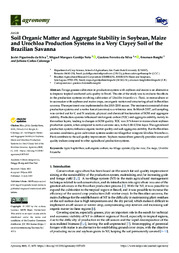Soil organic matter and aggregate stability in soybean, maize and Urochloa production systems in a very clayey soil of the Brazilian Savanna.
Soil organic matter and aggregate stability in soybean, maize and Urochloa production systems in a very clayey soil of the Brazilian Savanna.
Autoria: SILVA, J. F. da; GONTIJO NETO, M. M.; SILVA, G. F. da; BORGHI, E.; CALONEGO, J. C.
Resumo: Forage grasses cultivation in production system with soybean and maize is an alternative to improve tropical weathered soils quality in Brazil. The aim of the study was to evaluate the effects in the production systems involving cultivation of Urochloa brizantha cv. Piatã, in monoculture or in succession with soybean and maize crops, on organic matter and structuring of soil in Brazilian savanna. The experiment was implemented in the 2010/2011 season. The treatments consisted of nine production systems and a native forest (savanna) as a reference area. In March 2017, soil sampling was carried out for C and N analysis, physical and chemical fractionation of SOM and aggregate stability. Production systems influenced total organic carbon (TOC) and aggregate stability, mainly in the surface layers, leading to changes in SOM quality. TOC was 31% lower in monoculture soybean production system, when compared to native savanna area, in the 0.00?0.20 m layer. The agricultural production systems influence organic matter quality and soil aggregates stability. For the Brazilian savanna conditions, grain cultivation systems under no-tillage that integrate Urochloa brizantha cv. Piatã contribute to the soil quality improvement. Soybean monoculture generally provides worse soil quality indices compared to other agricultural production systems.
Ano de publicação: 2022
Tipo de publicação: Artigo de periódico
Unidade: Embrapa Milho e Sorgo
Palavras-chave: Capim Urochloa, Carbono, Gramínea Forrageira, Matéria Orgânica, Milho, Plantio Direto, Sistema de Produção, Soja, Solo Argiloso
Observações
1 - Por padrão são exibidas publicações dos últimos 20 anos. Para encontrar publicações mais antigas, configure o filtro ano de publicação, colocando o ano a partir do qual você deseja encontrar publicações. O filtro está na coluna da esquerda na busca acima.
2 - Para ler algumas publicações da Embrapa (apenas as que estão em formato ePub), é necessário ter, no celular ou computador, um desses softwares gratuitos. Sistemas Android: Google Play Livros; IOS: iBooks; Windows e Linux: software Calibre.
Acesse outras publicações
Acesse a Base de Dados da Pesquisa Agropecuária (BDPA) para consultar o acervo completo das bibliotecas da Embrapa.

